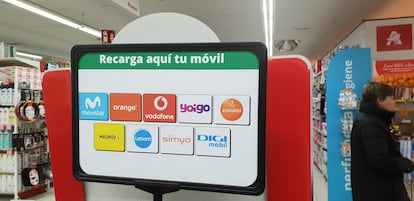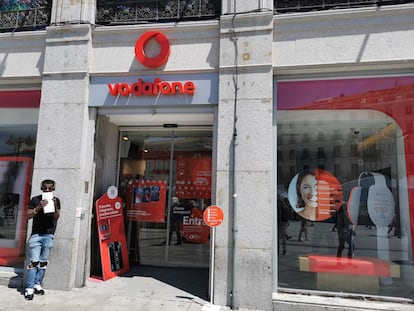Why Spain’s telecoms slap price hikes on their best customers and reward everyone else
Telefónica, Orange, Vodafone and Euskaltel are raising their fees for existing plans while simultaneously offering deals through their low-cost brands

Fierce competition in Spain’s telecommunications sector is driving operators to spend large amounts of cash on splashy ad campaigns for new “unparalleled offers.” Yet there is never any relevant information, not even in the form of a press statement, about the ongoing price hikes for existing customers.
The latter typically find out about an upcoming change to their plan through an SMS or a discreet message in their last invoice. Often enough, the customer will miss the message and only find out when the new charge is collected.
What is the point of companies’ seemingly suicidal strategy of reserving their worst treatment for their best-paying customers?
Experts note that this is a short-term approach: the financial benefits for the company last only until clients realize that they are paying an unusually high amount for services they can get elsewhere for half the price. Sometimes this is possible without even switching companies, as these have their own low-cost brands.

Operators say the underlying cause is the model adopted by Spain’s markets and competition watchdog, the CNMC, which forces large operators to share their networks with any company that requests it, at regulated prices. This kind of legislation makes it easy for newcomers to lower their rates to carve out a niche, and the large service providers are in turn forced to come up with their own low-cost brands in order to stem the exodus of clients.
Movistar (Telefónica) has O2, Orange has Simyo, Vodafone has Lowi and the Basque operator Euskaltel has Virgin Telco. These sister companies often have a similar range of services, but at prices that can be as much as 50% lower.
The Spanish market is immersed in an unstoppable transition to low-cost communications, proven by the fact that corporate revenue has been falling uninterruptedly for over a decade. In 2020, the losses were felt most keenly by the three largest operators: Telefónica lost 5.2%, ending the year with revenue of €14.6 billion, Orange shed 5.4% (€5.1 billion) and Vodafone gave up 3.4% (€4.8 billion).

At the other end of the spectrum, MásMóvil’s revenue grew 16.2% last year to reach €2.2 billion, while the Romanian-based Digi, which uses the Movistar (Telefónica) network, experienced accelerated growth of 41%.
Meanwhile, the main operators have quietly been raising their prices on existing plans. Telefónica was the first, applying a monthly price hike of €2 to €3 in mid-January on all its Fusion plans. Orange will raise its fees between €2 and €5 on several of its plans, including Love Original and Love Total. Vodafone is planning price hikes for mid-July, affecting clients on the One Ilimitada and Hogar Ilimitable plans.
Also in July, Euskaltel – now owned by MásMóvil and operating under three brands, Euskaltel in the Basque Country, R in Galicia and Telecable in Asturias – will charge up to €5 more a month for unsolicited improvements in landline, mobile, internet and television services.
English version by Susana Urra.
Tu suscripción se está usando en otro dispositivo
¿Quieres añadir otro usuario a tu suscripción?
Si continúas leyendo en este dispositivo, no se podrá leer en el otro.
FlechaTu suscripción se está usando en otro dispositivo y solo puedes acceder a EL PAÍS desde un dispositivo a la vez.
Si quieres compartir tu cuenta, cambia tu suscripción a la modalidad Premium, así podrás añadir otro usuario. Cada uno accederá con su propia cuenta de email, lo que os permitirá personalizar vuestra experiencia en EL PAÍS.
¿Tienes una suscripción de empresa? Accede aquí para contratar más cuentas.
En el caso de no saber quién está usando tu cuenta, te recomendamos cambiar tu contraseña aquí.
Si decides continuar compartiendo tu cuenta, este mensaje se mostrará en tu dispositivo y en el de la otra persona que está usando tu cuenta de forma indefinida, afectando a tu experiencia de lectura. Puedes consultar aquí los términos y condiciones de la suscripción digital.









































